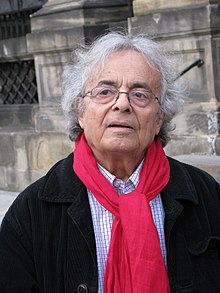
Back أدونيس (شاعر) Arabic ادونيس ARZ Adonis (şair) AZ آدونیس (شاعیر) AZB অ্যাডোনিস Bengali/Bangla Adonis (poeta) Catalan ئەدۆنیس (شاعیر) CKB Adonis (básník) Czech Ali Ahmad Said German Adonis DIQ
Adonis أدونيس | |
|---|---|
 Adonis on 12 May 2011 | |
| Born | Ali Ahmad Said Esber 1 January 1930 Al Qassabin, Latakia, Alawite State (Part of Mandatory Syria) |
| Pen name | Adonis |
| Occupation | Poet, writer, literary critic, editor |
| Language | Arabic |
| Nationality | Syrian |
| Period | Contemporary |
| Genres | Essay, poem |
| Literary movement | Modernism, avant-garde, surrealism[1] |
| Notable works | The Songs of Mihyar the Damascene, The Static and the Dynamic |
| Notable awards | Bjørnson Prize 2007 Goethe Prize 2011 |
Ali Ahmad Said Esber (Arabic: علي أحمد سعيد إسبر, North Levantine: Arabic pronunciation: [ˈʕali ˈʔaħmad saˈʕiːd ˈʔesbeɾ]; born 1 January 1930), also known by the pen name Adonis or Adunis (أدونيس Arabic pronunciation: [ʔadoːˈniːs]), is a Syrian poet, essayist and translator. Maya Jaggi, writing for The Guardian stated "He led a modernist revolution in the second half of the 20th century, "exerting a seismic influence" on Arabic poetry comparable to T.S. Eliot's in the anglophone world."[2]
Adonis's publications include twenty volumes of poetry and thirteen of criticism. His dozen books of translation to Arabic include the poetry of Saint-John Perse and Yves Bonnefoy, and the first complete Arabic translation of Ovid's "Metamorphoses" (2002). His multi-volume anthology of Arabic poetry ("Dīwān ash-shi'r al-'arabī"), covering almost two millennia of verse, has been in print since its publication in 1964.
A perennial contender for the Nobel Prize in Literature,[3][4] Adonis has been described as the greatest living poet of the Arab world.[5]
- ^ Irwin, Robert (3 January 2005). "An Arab Surrealist". The Nation: 23–38.
- ^ "Adonis: a life in writing". The Guardian. 27 January 2012. Retrieved 27 January 2012.
...He led a modernist revolution in the second half of the 20th century, exerting a seismic influence on Arabic poetry comparable to TS Eliot's in the anglophone world
- ^ McGrath, Charles (17 October 2010). "A Revolutionary of Arabic Verse". The New York Times. Retrieved 17 October 2010.
Every year around this time the name of the Syrian poet Adonis pops up in newspapers and in betting shops. Adonis (pronounced ah-doh-NEES), a pseudonym adopted by Ali Ahmad Said Esber in his teens as an attention getter, is a perennial favorite to win the Nobel Prize in Literature.
- ^ Pickering, Diego Gómez (11 November 2010). "Adonis speaks to Forward: The living legend of Arab poetry". Forward. Archived from the original on 15 November 2010. Retrieved 11 November 2010.
Last month, Adonis was robbed again of a Nobel Prize, after first being nominated in 1988.
- ^ "Adonis: a life in writing". The Guardian. 27 January 2012. Retrieved 27 January 2012.
each autumn is credibly tipped for the Nobel in literature